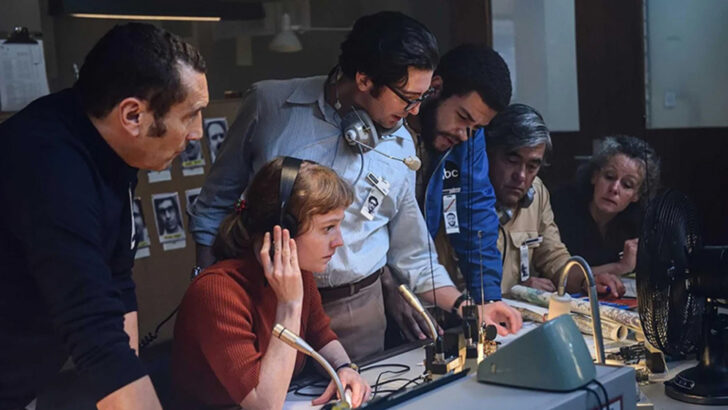September 5 began like any other day in Munich 1972. The Olympic Games were taking place there. Everyone was excited. Mark Spitz had just won his seventh gold medal in eight days.
Then terror struck. Or to be more precise, terrorism. Eleven Jewish athletes were taken hostage by five members of a commando wing of the PLO called Black September. They told the police one would be shot every hour unless 200 Palestinian prisoners were released from Israeli custody.
Tim Fehlbaum’s September 5 (15) isn’t the first film to be made about this incident. We’ve already had “21 Hours at Munich” (1976), One Day in September (1999) and Steven Spielberg’s Munich in 2005.
Here the emphasis is different. It isn’t on the incident itself but on a claustrophobic room in ABC Sports, the TV network transmitting it.
No matter how horrendous an event may be, a news channel has a programme to make. The people working here, no matter how traumatised they feel, have to keep at least a semblance of calm as they deliver updates to the public.
But what if they don’t feel traumatised at all? What if they see such a tragedy as an opportunity to gain leverage over an opposing network by having their ‘scoop’ in first?
“This is great stuff!” one of the team chirps to another in this film as a horde of people run terrified along a road. “You got it, Kubrick!” says a second.
At this point we’re in Network territory. Who can forget the ruthlessness of Faye Dunaway in Sidney Lumet’s landmark work apropos the super-importance of “ratings” at the expense of suffering? Peter Sarsgaard’s dead eyes match her here.
We know how this story ends. That’s why Fehlbaum needs to give us a different emphasis. His fly-on-the-wall approach (which never ventures near the terrorists or their prisoners) captivates with tense facial expressions, procedural priorities, satiric humour.
Over 900 million people watched these events on TV. That’s 300 million more than saw Neil Armstrong step on the moon three years before. What does that say about people’s appetite for bad news over good? Is it the case that “Good news is no news” for sensationalists?
In the end, ABC Sports’ lust for exclusivity rebounded on them. They went for broke with a revelation that proved to be untrue. The champagne should have been put on ice until all the facts were in.
The Munich police also came unstuck in their handling of the events. One was reminded of the dark days of World War II when a different set of Jews suffered at the hands of a certain German despot with a toothpaste moustache.
Would ABC Sports do better today? Hindsight is always 20/20. When one is in the eye of the storm, different laws apply.
Policemen consider whether to negotiate or shoot to kill. Cameramen ponder whether to shoot upper right or lower left.
Different strokes for different folks.


 Aubrey Malone
Aubrey Malone A scene from the film 'September 5' (2025)
A scene from the film 'September 5' (2025) 